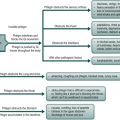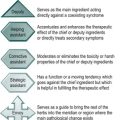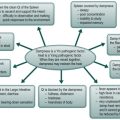7. Syndrome of Stomach-Yin deficiency
Manifestations
Main symptoms
Poor appetite or reduced appetite, a tendency to get hungry easily yet with an aversion to food, heartburn, thirst, dry mouth and constipation.
Secondary symptoms
Low-grade fever, warm palms and soles, loss of weight.
Tongue
Red and dry without coating.
Pulse
Thready and rapid.
Associated disorders in western medicine
Diabetes, chronic gastritis, gastric ulcer, hyperchlorhydria, aftermath of febrile diseases.
Analysis of the syndrome
The Stomach is located in the Middle-Jiao and is a Yang Ming organ, a place that is full of heat. As it connects the Yang meridians of the body, it is referred to as the sea of the Yang meridians. The Stomach receives food and drink and ripens them, a process that also produces heat. As a result, the Stomach-Yin is easily injured.
• When the Yin is insufficient in the Stomach, dry mouth and thirst may present.
• Since the Large Intestine belongs to the Yang Ming organs, the Yin can also be weakened. When the Stomach-Yin is deficient, constipation may occur.
• If the Spleen-Qi is weakened by being constantly consumed by the Stomach-fire for a long period of time, poor appetite or reduced appetite occurs.
• Hunger is the sign of food being consumed by fire. Although the empty-fire in the Stomach can bring the sign of fire that leads to a feeling of hunger, actually the Qi and Yin are too weak to digest food and therefore one will be averse to eating despite feeling hungry.
• The remaining symptoms and signs indicate the condition of general Yin deficiency, which may vary according to the degree of the Stomach-Yin deficiency.
Treatment principle: Tonify the Stomach-Yin
Herb selection principles and formula composition strategies
• First, herbs that are sweet and cold, enter the Stomach meridian and are able to directly nourish the Stomach-Yin are selected.
• Second, herbs that are sweet and cold, enter the Kidney meridian, and are able to nourish the Kidney-Yin, which is the source of the Yin of all the other organs, are selected. It is equally important to select herbs that tonify the Spleen-Qi in order to promote Yin generation.
• Third, herbs that soothe the Stomach-Qi and herbs that clear heat in the Stomach without the side effect of injuring the Stomach-Yin are selected.
Structure of the formula and selection of herbs
Chief: Nourish the Stomach-Yin
Shi Hu ( Dendrobii caulis)**
Shi Hu is sweet and slightly cold, and enters the Stomach and Kidney meridians. It is able to nourish the Stomach-Yin and Kidney-Yin, generate the body fluids, and reduce the empty-heat from these two organs. As the Kidney-Yin is the root of the Yin of all the organs, Shi Hu is considered an important herb because it can tonify the Yin from pro-heaven and post-heaven sources. This herb treats chronic and difficult cases of Yin deficiency of the Stomach.
Mai Men Dong ( Ophiopogonis radix)
Mai Men Dong is sweet and slightly cold, and enters the Lung, Heart and Stomach meridians. It can nourish the Stomach-Yin, moisten the intestines and treat thirst, dry mouth and constipation. It is very often used in the anaphase of febrile diseases where the Yin of the Stomach and intestines has been injured by heat.
Yu Zhu ( Polygonati odorati rhizoma)
Yu Zhu is sweet and neutral, and enters the Stomach and Lung meridians. It can gently and slowly nourish the Yin and moisten the Stomach. It is more suitable for chronic and mild conditions, or the condition where the patient is too weak to bear the cold and cloying herbs that tonify the Stomach-Yin.
Deputy: Nourish the Kidney-Yin
Sheng Di Huang ( Rehmanniae radix)
Sheng Di Huang is sweet and cold, and enters the Kidney, Heart and Liver meridians. As it can strongly tonify the Kidney-Yin, which is the root of the Stomach-Yin, it is often used in the condition of Stomach-Yin deficiency. In addition, as it can cool the blood and stop bleeding, it is often selected in bleeding conditions of the stomach and intestines.
Zhi Mu ( Anemarrhenae rhizoma)
Zhi Mu is bitter and cold, and enters the Lung, Stomach and Kidney meridians. Although it is bitter and cold, it is moist in nature and has no side effect of injuring the Stomach-Yin. It can directly reduce the excess fire or empty-fire from these organs, nourish the Yin and moisten the dryness. This herb is often used for severe thirst, constipation, night sweats and low-grade fever in conditions where the Stomach-Yin and Kidney-Yin are both deficient.
Dang Shen ( Codonopsis radix)
Dang Shen is sweet and neutral, and enters the Spleen and Lung meridians. It has no function in nourishing the Yin, but it can gently and sufficiently tonify the Spleen-Qi. As it is neutral in temperature, it has no side effect of injuring the Yin when it tonifies the Qi. It is used in the condition where the Yin and Qi are both injured and the Spleen and Stomach cannot bear very cold herbs in the process of tonifying the Yin.
Shan Yao ( Dioscoreae rhizoma)
Shan Yao is sweet and neutral, and enters the Lung, Spleen and Kidney meridians. It can either tonify the Qi or nourish the Yin. Its astringent property enhances its tonifying and stabilizing function. This herb is particularly useful in chronic conditions of Qi and Yin deficiency, such as in Thirst and West syndrome (diabetes) to moisten the internal organs and stabilize the body essence.
Assistant: Descend the Stomach-Qi, moisten dryness and clear the heat
Tian Hua Fen ( Trichosanthis radix)
Tian Hua Fen is sweet, slightly bitter, sour and slightly cold. It enters the Lung and Stomach meridians. Its sweet, sour and cold properties give it the function of generating the Stomach-Yin and the body fluid and of clearing heat. It is often used in the convalescence of febrile disease to relieve thirst.
Pi Pa Ye ( Eriobotryae folium)
Pi Pa Ye is bitter and cool, and enters the Lung and Stomach meridians. Pi Pa Ye can moisten dryness, soothe the Stomach-Qi and relieve nausea and vomiting caused by the heat in the Stomach.
Shi Gao ( Gypsum)
Shi Gao is sweet, pungent and very cold, and enters the Lung and Stomach meridians. It is an important substance to reduce excess heat in the Stomach and the Lung. Compared with herbs that reduce the heat of the Stomach, this substance is strong, effective and has no side effect of injuring the Yin of the Stomach as it is sweet and cold. In addition, it is often used in small dosage to reduce the excess heat that often coexists in the syndrome of Stomach-Yin deficiency.
Envoy: Harmonize the herbs in the formula
Yi Tang ( Maltose) and Feng Mi ( Mel)
These substances are sweet and moist in nature, and can moisten the Stomach and tonify the Spleen-Qi. In this way, they can harmonize the herbs in the formula and protect the Stomach and Spleen from cold herbs.
Common accompanying symptoms and treatment
• Food accumulation: add Mai Ya ( Hordei fructus germinatus) and Gu Ya ( Oryzae fructus germinatus) to aid the digestion.
• Belching or nausea: add Shi Di ( Kaki diospyri calyx) to descend the Stomach-Qi.
• Bleeding gums and loose teeth: add Shu Di Huang ( Rehmanniae radix praeparata), Zhi Mu ( Anemarrhenae rhizoma) and Huai Niu Xi ( Achyranthis bidentatae radix) to tonify the Kidney-Yin and reduce the empty-fire of the Stomach.
Examples of classical formulas
Yi Wei Tang (Benefit the Stomach Decoction) 
Source: Wen Bing Tiao Bian 
Composition
Mai Men Dong ( Ophiopogonis radix) 15 g
Bei Sha Shen ( Glehniae radix) 9 g
Sheng Di Huang ( Rehmanniae radix) 15 g
Yu Zhu ( Polygonati odorati rhizoma) 4.5 g
Bing Tang (rock sugar) 3 g
Analysis of the formula
This formula is devised for treating Stomach-Yin deficiency.
• Mai Men Dong, as chief, particularly nourishes the Stomach-Yin.
• Sheng Di Huang and Bei Sha Shen serve as deputies. They nourish the Kidney-Yin and Lung-Yin respectively, and therefore enhance the ability of the chief herb.
• Yu Zhu, another deputy, can gently nourish the Stomach-Yin and moisten the dryness.
• Bing Tang can harmonize the Middle-Jiao and tonify the Spleen-Qi, thereby serving as both assistant and envoy.
Commentary on strategies
This formula is nourishing in function but is not very cold. As it can moisten the dryness without any cloying side effect, it can be used in acute and chronic cases of Stomach-Yin deficiency.




